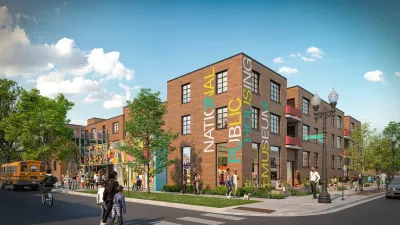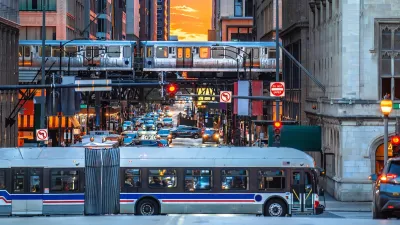Mirroring a nationwide trend, office parks in suburban Chicago are emptying out as companies increasingly favor urban locations. As a result, developers and local officials are having to think creatively about possibilities for office park reuse.
When Motorola Mobility announced recently that it would be trading in its home in Libertyville for prime space in Chicago's Merchandise Mart, it joined BP Amoco, United Airlines, and Sara Lee in helping to reverse the corporate exodus from Chicago, and cities across America, that marked the rise of the suburbs in the decades following World War II.
For reporter David Roeder, Motorola's move is, "another example of how the isolated, splendidly landscaped
corporate base in the suburbs has fallen out of favor." With office space in the suburbs facing a "hard sell" since the start of the financial crisis, "these compounds by and large must look to the private market for a new reason to exist."
"Daniel Miranda, president of HSA Commercial Real
Estate, said possibilities include turning some campuses into retail
centers, perhaps outlet malls, or converting them for medical or
educational uses. Some suburbs, Miranda said, may wish to convert the
campuses into a carefully planned 'mini-town.'"
"Many analysts have said a desire to recruit
younger, tech-savvy workers drives the job shift to downtown," notes Roeder. "Tony
Smaniotto, senior managing director at Studley Inc., said cost control
is another factor."
Some analysts however, like Art Burrows, senior vice president at NAI Hiffman, are skeptical of how long this trend will continue. He believes, "the suburbs will
come back when there's a clear price advantage and housing improves."
FULL STORY: Nobody home at suburban office parks

Alabama: Trump Terminates Settlements for Black Communities Harmed By Raw Sewage
Trump deemed the landmark civil rights agreement “illegal DEI and environmental justice policy.”

Study: Maui’s Plan to Convert Vacation Rentals to Long-Term Housing Could Cause Nearly $1 Billion Economic Loss
The plan would reduce visitor accommodation by 25% resulting in 1,900 jobs lost.

Planetizen Federal Action Tracker
A weekly monitor of how Trump’s orders and actions are impacting planners and planning in America.

Waymo Gets Permission to Map SF’s Market Street
If allowed to operate on the traffic-restricted street, Waymo’s autonomous taxis would have a leg up over ride-hailing competitors — and counter the city’s efforts to grow bike and pedestrian on the thoroughfare.

Parklet Symposium Highlights the Success of Shared Spaces
Parklets got a boost during the Covid-19 pandemic, when the concept was translated to outdoor dining programs that offered restaurants a lifeline during the shutdown.

Federal Homelessness Agency Places Entire Staff on Leave
The U.S. Interagency Council on Homelessness is the only federal agency dedicated to preventing and ending homelessness.
Urban Design for Planners 1: Software Tools
This six-course series explores essential urban design concepts using open source software and equips planners with the tools they need to participate fully in the urban design process.
Planning for Universal Design
Learn the tools for implementing Universal Design in planning regulations.
Caltrans
Smith Gee Studio
Institute for Housing and Urban Development Studies (IHS)
City of Grandview
Harvard GSD Executive Education
Toledo-Lucas County Plan Commissions
Salt Lake City
NYU Wagner Graduate School of Public Service





























